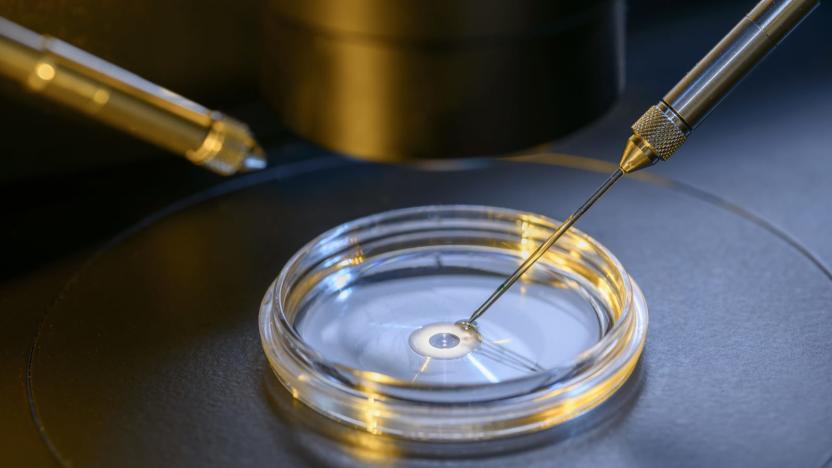ivf
Latest

Researchers grew a fully mature human egg in a lab
Researchers in the UK and the US have taken human eggs in their most early stage and developed them to maturity in a lab for the first time. It's a big achievement that could open up new avenues for infertility treatment and give scientists a better understanding of how the egg development process works and how it can go wrong. While this has been done before in mice, experiments of which have resulted in live offspring, this is the first time it has been done with human eggs.

UK doctors plan country's first three-person fertilization procedure
UK officials have approved two women for mitochondrial replacement therapy, the fertilization procedure that results in a baby technically parented by three people, the Guardian reports. The procedure, which still isn't approved in the US, was legalized in the UK in 2015 and the Newcastle Fertility Centre, where the two women will be treated, was granted a license to perform the procedure last March. While it's not the first time a procedure like this has been done, it is the first time it will happen in the UK.

'Three-parent baby' test success could mean human trials in two years
The theoretical and controversial method to make a baby from three parents, using in-vitro fertilization (IVF) to insert certain genes from a third person into a growing embryo, has been a long time coming. But after years of restricted research and testing on donor eggs, scientists at Newcastle University have successfully tested their mitochondrial replacement therapy (MRT) method in healthy human embryos for the first time. Should it be deemed safe enough, human trials could start in one or two years.

The UK inches closer toward making babies from three people's DNA
The UK's House of Commons overwhelmingly voted in favor of a law that would allow scientists to genetically engineer babies from the DNA of three people. Before your mind wanders to some of the more... salacious possibilities, the technique -- a spin on traditional in vitro fertilization -- is meant to help women with mitochondrial disease have families without fear of passing the illness down.

"Silicone womb" enters human testing in the UK
In-vitro fertilization may soon become much more effective, if a new device dubbed the "silicone womb" comes out of testing successfully. Currently test-tube embryos are developed in an incubator, but the .2-inch long silicone womb, produced by Anecova, allows them to be implanted inside the mother for up to four days, during which time they're exposed to the uterus through 360 40-micron holes. The goal is to develop stronger, more resilient embryos for eventual pregnancy, but a small test in Belgium has so far proven inconclusive as to the device's effectiveness -- and some researchers doubt it'll work at all, since the embryos will be located in the uterus rather than the fallopian tubes where they would naturally develop. Still, there's hope that the environment inside the uterus will be an effective substitute -- to quote one researcher, "it's a lot closer to a fallopian tube than a plastic tray." 40 women are signed up for testing starting today, but results aren't expected for some time.


